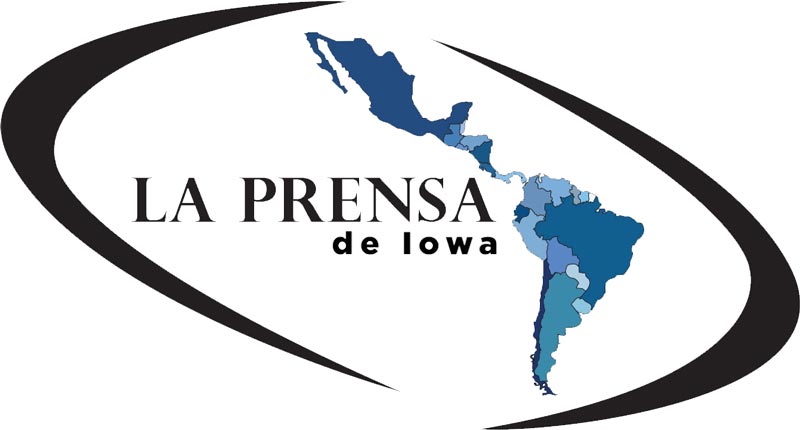De refugiado a misionero, el viaje del Padre Paul
/Padre Paul misionero de Santa Rosa de Lima.
Victoria Reyna-Rodríguez
LA PRENSA IOWA
Al haber viajado desde Vietnam hasta Norteamérica con tan solo 15 años en busca de refugio, es su valentía y capacidad para adaptarse lo que hace a Cuong Hung Nguyen, mejor conocido ppr los latinos de Denison, como el Padre Paul, un buen candidato para ser un sacerdote misionero.
Paul y su familia huyeron de Vietnam a finales de 1970 en busca de una. mejor vida, pero en el transcurso del viaje a Norteamérica, la familia terminó separada, y al correr de los años, Paul no supo nada de su familia, y comenzó a pensar que podrían haber fallecido.
Sin embargo, tres años después mientras estaba en Japón, Paul finalmente recibió noticias sobre su familia: estaban a salvo y tratando de llegar a su destino.
“Honestamente, gracias a Dios. Él nos dió una segunda oportunidad,” dijo.
A principios de 1980, Paul y su familia llegaron a Boone, Iowa. Él explica que fue un milagro el que hayan terminado juntos.
Paul cuenta que al llegar a su destino, sus padres le comentaron a él y a sus hermanos que “esta era nuestra oportunidad para comenzar una nueva vida y recibir educación,” algo con lo que siempre habían soñado: tener la oportunidad de estudiar, ir a la universidad, obtener un diploma y encontrar al amor de sus vidas para formar una familia.
Sin embargo, su vida cambió para siempre durante el octavo grado, cuando asistió a un retiro en Missouri. Durante el retiro, Paul escuchó historias sobre sacerdotes misioneros, quienes viajaban alrededor del mundo para visitar comunidades pobres, compartir el evangelio y proveer la ayuda y apoyo necesario. Paul recordó que tan pronto regresaron a casa del retiro, él le comentó a sus padres que quería convertirse en sacerdote misionero, pero sus padres estaban preocupados por lo que las personas de su cultura pensarían.
Paul explicó que en su cultura, “Si un hijo o hija asistiera a un seminario y se marchara, la gente en mi cultura se reirían [de los padres], no de los hijos, así que les daba miedo que eso pasara.”
Paul siguió con su educación preparatoria hasta que sus padres finalmente le dieron su bendición para asistir al seminario, donde le pidió a su hermano menor que los acompañara a su primera visita.
Después de la visita, el hermano de Paul también decidió convertirse en sacerdote; a pesar que los hermanos asistían al seminario juntos, pronto se separaron ya que su hermano decidió tomar un camino distinto al de Paul para convertirse en sacerdote de diócesis.
Paul estudió en el seminario por cuatro años mientras obtenía su carrera en matemáticas y estudiaba filosofía y teología. Después pasó un año en Illinois en la “casa madre” discerniendo su vocación, estudiando historia de misioneros y sacerdotes y orando.
Después del año, comenzó a estudiar en el programa de teología; Se alojó en Chicago durante sus primeros dos años antes de mudarse a las Filipinas para ser parte del “entrenamiento intercultural” en una comunidad pequeña.
“Tratamos de ser sus amigos y apoyarlos de varias formas.”
Paul dijo que normalmente socializaba con los de la comunidad hasta que su salud comenzó a ponerse delicada para él.
“Tuve problemas con mi salud, me contagie de malaria dos veces.”
A falta de agua limpia y recursos de salud, Paul enfermó de malaria, admitiendo que la segunda vez fue peor que la primera.
“Me pregunté a mi mismo ‘¿Es esto una señal de que no me convertiré en sacerdote?’ entonces me puse a rezar y le pedí al Señor que me guiara; a pesar de que mi salud era pésima le rogué a Dios ‘solo dejame terminar mis dos años en las Filipinas.”
Y lo hizo; Paul se recuperó de sus enfermedades, completó su misión y regresó a Norteamérica para terminar sus estudios en teología en Chicago.
Finalmente, el 4 de junio del 2000, Paul se ordenó oficialmente como Sacerdote misionero Católico.
“Después de convertirme oficialmente en misionero, viaje a Argentina para mi primera misión,” dijo. “Ni siquiera sabía el lenguaje, honestamente nadie de [los que fuimos] sabíamos.”
El explica que al comenzar su nueva vida en un nuevo país cuando era un refugiado, incluso cuando aún vivía en las Filipinas, eran tiempos difíciles y atemorizantes para él.
“Me di cuenta que era como cuando vine como refugiado y tuve que aprender un nuevo idioma,” Paul explicó. “Honestamente, es horrible mudarte a otro país y no saber el idioma o conocer a nadie, a veces te puedes sentir solitario, y te pones a pensar en serio ‘?realmente quiero que mi vida sea así?’”
Aun así Paul no se dio por vencido y después de seis meses de entrenamiento intensivo de lenguaje, él estaba listo para comenzar a servir en una pequeña comunidad de Argentina donde él vivía.
Durante su estancia, brindó apoyo y asistencia a la comunidad durante misas y otras actividades de la iglesia. Adoraba a la comunidad y la comunidad lo adoraba, sin embargo su misión sólo duraría cuatro años. Y a pesar que se le había otorgado tres meses de vacaciones para ver a su familia, Paul estaba listo para regresar a trabajar.
Una vez que terminó su descanso, fue a servir en las comunidades de Illinois durante ocho años, pero Paul sabía que estaba listo para probar algo nuevo, así que le preguntó a sus superiores si podía ser transferido a la Diócesis de Des Moines.
Una vez que lo aprobaron, fue asignado al Sagrado Corazón en West Des Moines durante un año, y luego a Perry durante dos años antes de regresar a Chicago. Paul estaba un poco ansioso de dejar Chicago ya que no tuvo la oportunidad de socializar con tantas personas como le hubiera gustado y sentía que su vida era muy “ordinaria.”
Así que se comunicó con su hermano, quien se encontraba en la Diócesis de Sioux City, para ver si necesitaban sacerdotes. Para su sorpresa, si les hacía falta ayuda y muy pronto fue aprobado para ir a Sioux City; tiempo después en 2016 se mudo a Boone, donde su viaje en Norteamérica había comenzado.
Actualmente, Paul vive en Manning y sirve a las comunidades de Manilla, Manning, Vail y Denison, donde se enfoca en las necesidades de las comunidades Hispanas.
“Me identifico bien con ellos [los inmigrantes] porque soy un refugiado.”
El explica que comprende las dificultades por la que la comunidad Hispana ha pasado, el sentimiento al ver a su familia batallar y el sufrir discriminación.
“Vine aquí de la misma manera que ellos, batallando, pero tenemos que poner a Dios primero; a Dios y a nuestra familia, porque sin ellos, esto no funcionaria.”
Tristemente, el servicio de Paul en Sioux City terminará el 4 de julio de este año. Esto le entristece ya que dijo que ha recibido mucha bondad y hospitalidad desde que llegó a Iowa.
“Atesoro a la gente de aquí, las personas en Iowa son muy diferentes.”
A pesar que hasta el momento, él no sabe a dónde será su próximo lugar de asignación, dice que será feliz a donde quiera que vaya, especialmente si se queda en Iowa. Si no es así, Paul dice que extrañará a la gente de aquí.
Él está agradecido por la familia que creó aquí al igual que por la comunidad Hispana que siempre estuvo con él; “especialmente porque la comunidad latina tiene tanto que dar a pesar de tener tan poco.”
“Normalmente hacen fiesta a los padres que van asignados a otros lugares,” Paul dijo. “Así que les dije, ‘¿saben qué? No tienen que hacerlo, si vienen a misa ese seria el regalo más maravilloso que me pueden dar.’”
El pide a la comunidad que no le den regalos o cosas materiales en forma de despedida porque “lo material viene y va, pero la hospitalidad, la honestidad y las sonrisas que me han brindado sobre mi estancia aquí, son los regalos más importante que siempre los voy a guardar conmigo.”
Reverendo Cuong Hung “Paul” Nguyen, quien previamente sirvió en la parroquia de Santa Rosa de Lima en Denison, El Sagrado Corazón en Manning, y el Velo de Santa Ana, ha sido asignado a una nueva localidad, más no dejará la Diócesis. Fue asignado a la parroquia de Santa Maria en Hawarden, y San Patricio en Akron.
Translation
From Refugee to Missionary, Father Paul’s Journey
Missionary Father Paul from Santa Rosa de Lima.
Victoria Reyna-Rodríguez
LA PRENSA IOWA
Having journeyed from Vietnam to America at the young age of 15 in search of refuge, it is his resilience and bravery that makes Cuong Hung Nguyen, better known as Father Paul, a perfect fit as a missionary priest.
Nguyen’s family fled Vietnam in the late 1970s in search of a better life. Horrifyingly, they became separated on their journey to America. Having not seen his family in years, Nguyen had begun to think they may have died.
Three years later, while in Japan, Nguyen got news his family was still alive and still journeying to America as well.
“Honestly, thank God. God gave us a second chance,” Nguyen said.
In the early 1980s Nguyen and his family arrived in Boone, Iowa. Nguyen said it was a miracle that they all ended up back together.
After arriving in America, Nguyen’s parents told him and his siblings that this was their opportunity to start a new life, to get an education. Nguyen wanted this for himself. To get an education, go to college and get a degree, and find a wife and start a family.
But, in the 11th grade, Nguyen attended a retreat in Missouri that changed his life forever. At this retreat, Nguyen heard stories from a priest about missionary priests. Priests who journeyed all over the world to communities in need and spread the gospel and provided whatever support they needed. Nguyen said as soon as he got home from the retreat, he told his parents he wanted to be a missionary priest, but his parents were timid.
“If a son or daughter went to the seminary and left, the people in my culture would laugh at [the parents], not the children, so they were afraid of that,” Nguyen said.
So Nguyen continued his high school career, and finally received his parents’ blessing to attend seminary. Nguyen asked his younger brother to accompany him on his first seminary visit.
After this single trip, Nguyen’s brother decided to become a priest as well. While the brothers started seminary together, they soon split as Nguyen’s brother wished to become a diocese priest, while he was still set on missionary work.
Nguyen studied at the seminary for four years, while also obtaining his degree in mathematics and studying philosophy and theology. He then spent a year in Illinois at a “mother house,” discerning his vocation. Here he studied the history of missionaries and priesthood, prayed and focused on discernment.
Finally, after a year of discernment and praying, Nguyen started a program to study theology. He was located in Chicago for the first two years before moving to the Philippines for a two year “cross cultural training.”
Nguyen lived in a small community in the Philippines during his time as a missionary there.
“We try to be their friends and support them in many ways,” Nguyen said.
Nguyen said he mainly just socialized with people from the community. Until things started to get bad for him.
“In the Philippines I was struggling with my health. I had malaria two times,” Nguyen said.
Due to the lack of clean water and little access to healthcare resources, Nguyen fell sick with malaria twice while on his mission in the Philippines. Although he says the second time was by far the worst.
“I said to myself, ‘Is this a warning that I will not be a missionary priest?’ And I prayed, I asked the Lord to guide me. I just kept struggling with my health but I said, ‘Let me finish my two years with the people of the Philippines,’” Nguyen said.
And finish he did. Nguyen recovered from his illnesses and completed his mission in the Philippines, returning to America after two years to finish his theological studies in Chicago.
Finally, on June 4, 2000, Nguyen was ordained as a Roman Catholic missionary priest.
“When I was ordained in the year 2000 I went down to Argentina for my first mission,” said Nguyen. “I went down there, I didn’t even know the language. And most of us, when we go down there, we don’t even know anyone.”
Nguyen explained how he had started a new life in a new place before as a refugee, and before that in the Philippines, he said it’s difficult and scary every time.
“I realized that when I came here as a refugee, starting a new language, it’s like the same thing,” said Nguyen. “Honestly, it’s terrible when you come to the country and don’t know the language, don’t know anybody, it can feel lonely sometimes. And you think, ‘do I really want it to be like this?’”
But, Nguyen said the most important thing was that he never gave up. After six months of intensive language training, Nguyen was ready to start serving the small Argentinian community he was living in.
During his time in Argentina, Nguyen provided support and assistance to the Argentinian community, as well as helped out with masses and church activities. He came to love the people, and the people loved him, but his mission in Argentina ended after 4 years.
After his mission in Argentina, Nguyen was allowed to have a three month vacation with his family. Although he was ready to get back to the job.
After his break, he served as a missionary priest in Illinois communities for eight years. Nguyen said he was ready to get to something new, and asked his superiors if he could transfer to the Des Moines Diocese.
Nguyen was approved and served at Sacred Heart in West Des Moines for one year and then in Perry for two, before returning to the Chicago area. Nguyen said he was anxious to leave Chicago, as he didn’t get to socialize with as many different people as he’d like, his life was too “normal.”
So, Nguyen asked his brother at Sioux City Diocese if they needed any priests. And to his surprise, they did. Nguyen was soon approved to serve the Sioux City Diocese and in 2016 came back to Boone, Iowa, where his journey in America began.
Nguyen now lives in Manning and serves the communities of Manilla, Manning, Vail and Denison, primarily focusing on the needs of the Hispanic community.
“I relate to them well, I’m a refugee too,” Nguyen said.
Nguyen says he understands the Hispanic community because he knows struggle, he knows what it’s like to watch your family struggle and he knows what it’s like to be discriminated against.
“I came here like you, struggling, but we have to have God first. God and our family,” Nguyen said. “Without that, it doesn’t work.”
Sadly, Nguyen’s history serving the Sioux City Diocese is coming to an end on July 4 of this summer.
Nguyen said he is sad to leave this community, as he has received so much kindness and hospitality since coming back to Iowa.
“I treasure the people here, the people in Iowa are really different,” Nguyen said.
Nguyen also said he doesn’t know where his next assignment is, but he will be happy wherever he goes, especially if he stays in Iowa. If he doesn’t stay in Iowa, Nguyen said he will miss the people here.
Nguyen is grateful for the family he has made here, and he says he is thankful for the Hispanic community that surrounds him. Especially because they share so much, even when they have so little.
“Usually, they have a party for the priest,” said Nguyen. “I said to them, ‘You know what? Don’t do that. If you come to mass with me, that is the most wonderful gift.”
Nguyen said he asks the community not to give him any material gifts as a way of saying goodbye.
“Material things come and go,” Nguyen said. “The hospitality, the honesty and the smiles that you give me are more important things.”
Reverend Father Cuong Hung “Paul” Nguyen, who previously served as Parochial Vicar of St. Rose of Lima in Denison, Sacred Heart in Manning and St. Ann in Vail has been assigned to a new location, but will not be leaving the diocese. Father Nguyen is now assigned as Parochial Vicar of St. Mary, Hawarden and St. Patrick in Akron.








































